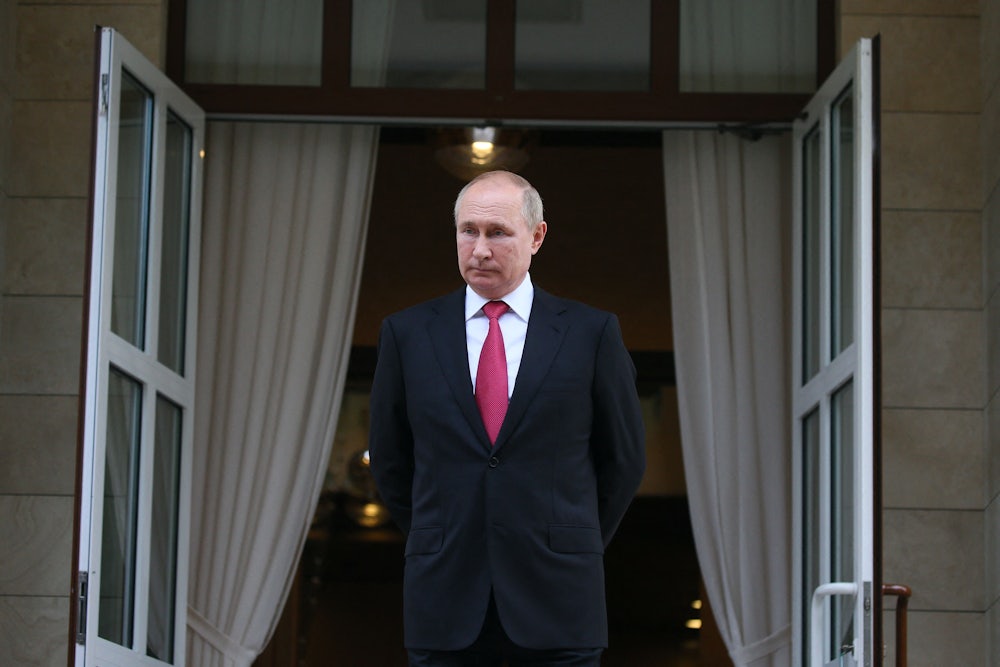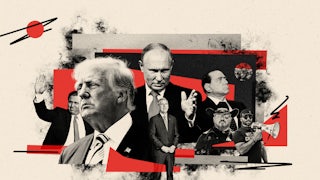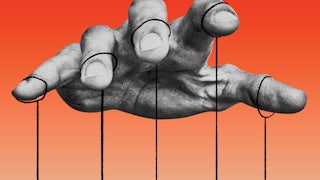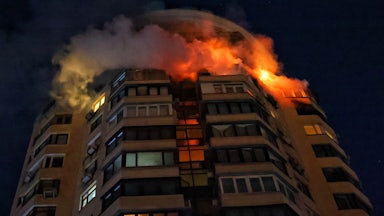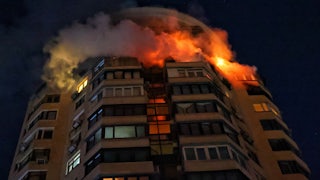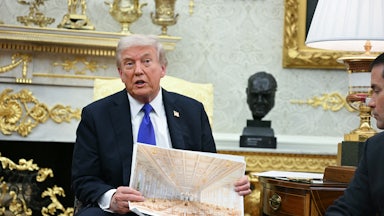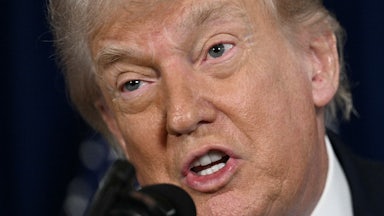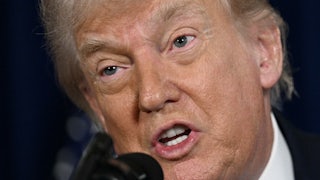From the start of Russia’s war on Ukraine, suspicions of war
crimes have been pouring in. There were attacks on civilian targets, including schools
and 41 hospitals or medical facilities. The U.N. counted 24 cases of cluster bombs by the end
of March;
Ukrainian authorities claimed white phosphorus had been used, while Mariupol and
other cities and towns are under siege. Then came Bucha, with apocalyptic
scenes of executions, mass graves, possibly thousands of rapes.
Is there anyone of sound mind who doesn’t want to see wrath and retribution visited upon Vladimir Putin? Frankly many, and not only Ukrainians, want him dead. But in the interest of a higher human ground, “The Hague” has become the rallying cry. Ukrainians pulled out road signs as the Russian tanks rolled in, and people have reported signs saying, “This way to The Hague.”
“Hague is the magic word. Everyone wants them in The Hague,” said Mykola Gnatovsky, a Ukrainian professor of international law at the University of Kyiv and an independent adviser to the foreign minister on issues of international criminal and human rights law, in an interview. The Ukrainian prosecutor general’s office has asked citizens to report crimes in an online form, and Gnatovsky relates that the response has been strong.
Inna Sovsun, a Ukrainian parliamentarian from the pro-European Golos Party, believes that the need for justice trumps negotiations to end the war. “My understanding is that if we get a deal, we cannot follow the legal procedure of punishing them,” she said in an interview, noting that an agreement might neutralize such claims. “I want justice for kids whose parents were killed in front of them … [for] the six-year-old boy who witnessed his mom being raped for two days by Russian soldiers. And if we get a deal, that will mean that that son will never get justice for his mom, who died of her wounds.” Andriy Zavalko, a lawyer in Kyiv, said that he prefers a legal process to the ultimate punishment for Putin: “Not the death penalty. I want this to be investigated very thoroughly, to show the Russian citizens exactly what happened.”
The mechanisms of international law are fired up. In the early days of the war, 39 countries referred the matter to the International Criminal Court (ICC); two more joined later. Ukraine appealed to the International Court of Justice (also seated in The Hague) to reject Russia’s perversion of the Genocide Convention as its pretext for war and appealed to the European Court of Human Rights. Both courts ruled in Ukraine’s favor. U.S. President Joe Biden, Secretary of State Antony Blinken, and UK Prime Minister Boris Johnson have accused Russia of war crimes or called Putin a war criminal. Biden did it twice and just last week accused Putin of “genocide.”
Yet holding Russia to account will be extremely difficult in practice; some say impossible. Political, legal, and geographical constraints mean that Putin can’t just be nabbed and put on the stand. And the problems of international trials run deeper still. There are technical, moral, legal, and political complications. Victims awaiting justice can lose faith in the process altogether, mirroring the fragility of international norms and institutions overall. Can a young, fragile, and imperfect system overcome earlier problems and do better in Ukraine?
Why so troubled?
International justice is an audacious notion. It rests on international human rights and humanitarian law, which aspire to an ambitious global standard for human protection—including during wartime. Permanent international courts are established by treaties, and states that ratify them submit a measure of their sovereignty to courts in a foreign land. International courts and tribunals can also find ways to prosecute those who have not ratified international statutes. However, the project is politically fraught. It can be seen as challenging state sovereignty—but in the name of something higher.
The system is also in its infancy. The first modern international war crimes tribunal was Nuremberg; there were no more official international tribunals until 1993. Mary McGowan Davis, a retired New York State Supreme Court justice who has since participated in UN inquiries following two wars between Israel and Hamas in Gaza (she chaired the 2014 Commission of Inquiry) and other international cases, recalled that in law school in the 1970s, the topic was barely a subject of study, other than Nuremberg.*
But the evolution of global justice accelerated. The
International Court of Justice was established in 1945 by the U.N. charter to adjudicate disputes between
states. The ICC—formed to hold individuals responsible for war crimes, crimes
against humanity, genocide, and the crime of aggression—began operating only 20
years ago. Ukraine might also prosecute Russian crimes locally.
With so many institutional options, why does prosecuting Putin remain elusive?
For one thing, neither Ukraine nor Russia has joined the International Criminal Court. Ukraine got around this problem by accepting the court’s jurisdiction in 2014 following the first Russian invasion in order to pursue claims then.
But there is no way to arrest Vladimir Putin in Russia, and the court cannot try someone in absentia. Even if the ICC issued a warrant, customary international law, and many individual states, recognizes immunity for heads of state (though the issue is complex and evolving). If Putin were to travel, other countries are unlikely to arrest and extradite him as long as he remains in power.
Further, proving war crimes is a painstaking legal challenge. Biden’s own caution in using and explaining the term highlights this complexity. But is that the real question to ask? Many argue that the entire war is a crime. What the Nuremberg charter called “a crime against peace” has a modern successor: the “crime of aggression.” The Rome Statute (the treaty that established the ICC in 1998) included this crime in its original mandate, but participating states took over a decade, till 2010, to define it, then another seven years to agree on the law’s jurisdiction. Unlike the court’s clear mandate to prosecute war crimes, crimes against humanity, and genocide, the crime of aggression was not “activated” until 2018. And if a country, like Russia, has not acceded to the court, its citizens can be charged only through a referral from the U.N. Security Council—where Russia, as one of five permanent members, has a veto.
In response, days after the start of the war, Philippe Sands, an international lawyer, professor of law at University College London, and author of books about the evolution of legal norms challenging genocide and war crimes, called for a special tribunal to prosecute the aggression of the war act, leaving other crimes, like those committed in Bucha, to the ICC. The idea snowballed. Two former U.K. prime ministers signed on, along with over 100 luminaries of international justices, including writers and other former political leaders. A working group is now hammering out the details.
An ad hoc tribunal might claim the jurisdiction to try Putin, but there is still no way to haul him in. Ugandan warlord Joseph Kony, who pressed children into military service, has been wanted by the ICC since 2005 but is still at large. Likewise Sudan’s Omar al-Bashir has so far evaded his ICC indictments for horrible charges, including genocide, though he is currently serving a two-year sentence in Sudan for lesser crimes. Two of the worst Bosnian Serb perpetrators, Ratko Mladic and Radovan Karadzic, roamed the streets of Belgrade or other towns for years until Serb authorities finally “found” and handed them over—curiously, while Serbia was accelerating its efforts to join the EU.
Another major problem is justice delayed. The International Criminal Tribunal for Yugoslavia (ICTY) famously took decades to locate, prosecute, and convict war criminals. The wars were in the 1990s; the tribunal completed its work in 2017. Slobodan Milosevic had been at The Hague for five years when he died of a heart attack in 2006. He was never convicted, to the eternal disappointment of many.
Conceptual problems of international prosecution run even deeper. The concept of “victor’s justice” remains a criticism of Nuremberg, and there is some legal consensus that justice must belong to all. The ICTY diligently tried Bosnian Serbs, Kosovar Albanians, and Croats alike. But that led to rampant bitterness among any group that felt itself to be the true victim—even Serbs, who often harbor an endemic persecuted-victim complex. The result has been a defensive backlash in Republika Srpska and denial of the very crimes the court set out to establish as fact.
Justice is enmeshed in politics. Perhaps the greatest accusation against the fledgling system of international justice is hypocrisy. The United States also invaded a sovereign nation, Iraq, in 2003, under what turned out to be false pretenses—yet there was no sweeping call for a tribunal. Philippe Sands says the claim of double standards gets to him “because it has legs.” Personally, “I was also very opposed to war in Iraq, which was also manifestly illegal,” he told me, but he explained that the problem is far bigger. Though many lauded the sweeping condemnation of Russia in a U.N. General Assembly resolution, “half of the countries of Africa abstained. Why? I’ve spoken to African ambassadors. This is a real issue.”
Some African countries have long felt unfairly targeted by the ICC, while big or powerful countries shrug off responsibility. Russia, the United States, and Israel have all declined to join the ICC. Israel claims to support international justice, but recoils at the notion that international law would limit or even censure the country’s expansionism in Palestinian areas or its military actions. Israeli politicians have attacked both international courts and U.N. investigating commissions as antisemitic.
The unfairness of the international order, in turn, feeds the feverishly paranoid mind of the country that hates this order the most: Russia.
And speaking of Russia and this war, here is the hottest-burning question of all: Can international justice do anything to stop the violence? In Sands’s book East West Street, he relates that in the 1930s, Rafael Lemkin, the Polish lawyer and scholar, was a “practical idealist” who “believed that proper criminal laws could actually prevent atrocity.” The current draft charter to establish a tribunal for Ukraine states that one of its aims is “to help beat back President Putin’s heinous attempts to destroy peace in Europe.”
Concepts of war crimes existed even prior to World War II, but nothing stopped atrocities so extreme that Lemkin ultimately established a whole new category: genocide. (He coined the word). The ICTY was formed in 1993, during the war, but it couldn’t stop the siege of Sarajevo or the massacre of Srebrenica. The Rwanda tribunal (ICTR) did commendable work from 1995 onward, but only after over 800,000 people had been slaughtered.
How will Ukrainians feel if they must wait years and years for convictions? How will Ukrainians feel if Putin is never personally tried? “I cannot imagine such a thing,” said Olga Vasylevska-Smaglyuk, a Ukrainian lawmaker from President Volodymyr Zelensky’s party, whose district includes Bucha, while visiting Israel to plead her country’s cause. How will Ukrainians feel if their own soldiers—“defenders”—are tried on suspicions of war crimes against Russian soldiers?
If international justice fails the people of Ukraine, will it fail altogether?
Justice can do better
From the despair of World War II, international justice emerged in its modern form. Perhaps the devastation of Ukraine will force new answers, or at least improvements.
Delayed justice, for example, can be hastened. Davis, the retired New York judge, observed that the special tribunal in Senegal that prosecuted Chad’s dictator, Hissène Habré, “took fifteen years to get him there, but trial was four months.” Senegalese courts use French civil law procedures and an “inquisitorial” rather than “adversarial” mode of testimony, which some believe to be more streamlined. Habré was convicted and sentenced to life in prison in 2016, where he died of Covid-19 last August.
Sir Geoffrey Nice is a barrister who led the prosecution against Milosevic. In an interview from London, Nice was unsparing about the time imperative. “What benefit is there for the mothers of Srebrenica to have 30 years of uncertainty?” he demanded, noting that The New York Times ran a long spread about the events in 1995 that told the story accurately. “Why did it take thirty years?” He hinted that top-heavy processes project not justice but the whiff of waste or greed—they cost billions, generate massive bureaucracy, and alienate the victims.
By contrast, over the last two years, Nice chaired an independent Uyghur tribunal to try the Chinese government for alleged genocide. With no formal international backing, the trial had no authority. But the justices worked pro bono, and after two hearings in 2021, the court found the government officials guilty of genocide. Nice explained that balancing witness testimonies—essential for moral force—with printed documentation can slash the time. Davis noted that experts are considering the creation of a standing expert team for investigating war crimes, perhaps attached to a U.N. agency or international courts, which can snap into action in the future.
Stephen Rapp, former U.S. ambassador-at-large for global criminal justice and a former international prosecutor at Rwanda and Sierra Leone tribunals, emphasized the need for proceedings to be clearly communicated to regular people, “accessible, televised, with programs to explain things in appropriate language, without a lot of legalese. Quite often the material is inaccessible to the people most affected by it.” The 64-page Uyghur decision dictated: “No legal or other specialist knowledge is required to understand the Judgment.”
The towering problem remains that Putin or his advisers, enablers, and military commanders might never physically go to trial. But if the ICC does not try defendants in absentia, a special tribunal can make its own rules, if other countries or international bodies are prepared to ratify them. Gnatovsky, the Ukrainian legal scholar, said cautiously that he normally wouldn’t favor in absentia proceedings, but “under the circumstances, it might be the best, pragmatic solution.” And indictments by any of the courts for anyone who is not a head of state means such a defendant can be extradited to The Hague if traveling abroad. That could trap the accused at home—or possibly even deter crimes.
There have also been significant successes with physical prosecution. Liberia’s Charles Taylor was tried and convicted. Habré. Milosevic. Dozens of lower-level perpetrators from the former Yugoslavia. Last August, Sudan’s government finally announced that it would turn Bashir over to the ICC. When asked in a television interview whether Putin could avoid justice, Geoffrey Nice responded: “History shows us that we can be surprised by the way things develop.”
The paradox remains that equal treatment of both sides under the law feeds bitter “both-sider-ism.” But it seems likely that isolated incidents such as Ukrainians’ mistreating Russian soldiers will be dwarfed by the magnitude of Russian crimes. At the start of research for this article, none of the international law experts I spoke to anticipated charges of genocide. But by the time the scenes from Bucha were revealed, Zelensky and then the president of the United States said the word. Moreover, if a tribunal is formed for the crime of aggression, only one side would be on trial.
As for claims of victors’ justice, Nice issued a radical proposal. In extreme cases, overwhelming, categorical blame is appropriate. In two essays for a Bosnian newspaper in January, he suggested Nuremberg’s unambiguous assignation of virtue and guilt, the moral certainty, allowed both the allied powers and Germany to revive and flourish. In the former Yugoslavia, the sides still competed over guilt and victimhood, and Bosnia’s wounds keep festering. Nice knew it was a “heresy” to say so, but he wrote that “victor’s justice may not, after all, be such a bad thing.” The insight feels eerily appropriate: Victor’s justice was a good thing after the fall of the Reich, not because the Allies won, but because they were on the side of moral right.
Moral clarity sounds desperately good in a world where lies and moral obfuscation are oxygen to Putin’s fire—also stoking campaigns for Trump, Brexit, and against vaccines to boot. This approach recognizes truth and obliges anyone with human decency to pass judgment when the facts are evil.
Still, it is probably essential to acknowledge what international law can’t do, or at least has never done, such as stop the slaughter. Sands said he’s “not starry-eyed” on this point. But he still hopes that the threat of international prosecution can raise doubts among individual Russians and even spur defections, while the show of solidarity could boost Ukrainian battlefield morale.
Clearer, more limited expectations are in order too. Justice can establish facts, air the victims’ stories, strengthen the historic record against the liars. It may deter other leaders or individuals, if only slightly.
Going beyond helping the victims, the larger point is that international justice is key to the international system that Putin longs to destroy. Vasylevska-Smaglyuk, the Ukrainian lawmaker, said she knows “The Hague tribunal is not the worst case for [Putin].” What is? “Our winning is the worst. If we win, that will be his nightmare.” But a victory for international justice would defeat Putin at a whole different level.
* This article has been updated to clarify Mary McGowan Davis’s roles in the UN inquiries.
